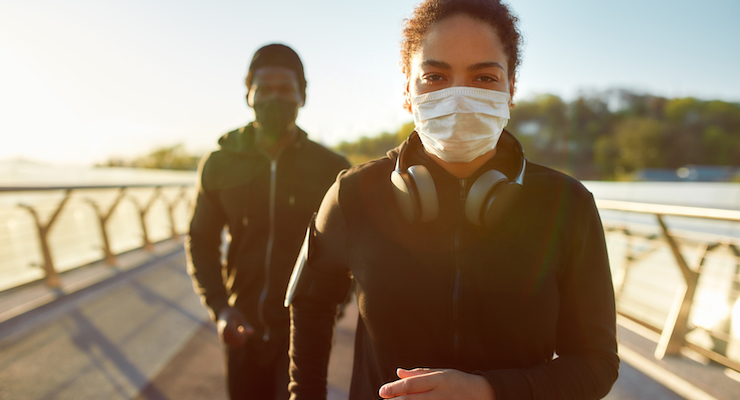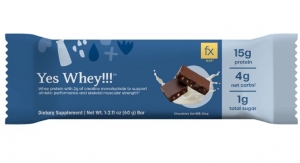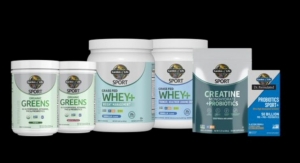By Mike Montemarano, Associate Editor10.05.20
Optimum Nutrition, a company specializing in whey protein, pre-workout formulas, vitamins, energy supplements, and more, announced the results of a survey it conducted on the impact that COVID-19 has had on American consumers’ approaches to sports nutrition, fitness, and overall well-being.
Additionally, the company kicked off a week of free training, education, and other types of sessions to support people as they seek to navigate fitness, performance, and overall health in the “new normal.”
Fitness in Isolation
Optimum Nutrition commissioned a survey on its consumers to understand areas in which people have been experiencing challenges to supporting their health. Results of the survey, which centered on fitness and sports nutrition, corroborated many findings that apply to other areas of wellness.
“COVID-19 has disrupted our fitness and nutrition routines and it’s taught us a lot about ourselves,” said Sarah Lombard, marketing director for Optimum Nutrition. “We commissioned this survey to measure how we could support consumers maintaining their fitness and self-care routines.”
According to the survey, 63% of the 1,004 consumers polled said they’re not as active as they’d like to be. Despite virtually the same number of people (62%) stating that they’re more concerned with their overall health, the survey revealed that over half (51%) of consumers are exercising less than before the pandemic hit.
This indicates a bifurcation is happening in which about half of fitness enthusiasts are moving in the opposite direction of their aspirations—largely (85%) due to the barriers they face to improving health, including lack of motivation (38%), lack of financial resources (33%), or lack of access to equipment and proper training for workouts (30%). Only 15% of consumers feel at this time they have no barriers to improving their health, the survey found.
A bifurcation in assessments of diet quality is also occurring, as 42% of consumers reported eating less healthy before, compared to a majority (58%) who report that their diets are just as healthy or healthier now.
Mental health is also being impacted by the times, signifying another health burden. Two-thirds of respondents are more stressed or anxious than they were before the pandemic began, and 45% of those surveyed reported they’re feeling less like themselves. Sixty percent of consumers reported they feel like they’ve lost a sense of community because of COVID-19, and two in five are concerned about maintaining relationships with friends and family, Optimum Nutrition reported. Consumers desired to break bad sleep habits (43%) just as much as they wished to break less-than-optimal exercise habits (44%).
Changes in the mindsets of U.S. consumers go deeper than the gloom and doom, however. Despite the burdens on health and wellness consumers are experiencing right now, they also shared signs of optimism about some of the pandemic’s effects. For example, 86% of consumers reported they feel the pandemic could lead to a lasting improvement of some kind in their lives, such as a deeper appreciation for the little things in life (63%), a deeper appreciation for friends and family (56%), or for themselves and what they’re capable of doing (38%). Nine in 10 reported they’ve learned something about themselves, and a third of those realized that they are “strong and resilient”; 7 in 10 believe they can emerge from the COVID-19 pandemic “better than before.”
Supplement Specifics
As a result of the health implications posed by both COVID-19 itself and the health effects of social distancing, a groundswell of interest in learning how to manage overall health and well-being is occurring, the survey found, with mutually significant interest in both dietary supplements and exercise.
In terms of managing health issues, 42% of consumers said they were interested in learning how to better manage stress and anxiety, and 41% want to know more about how to improve their sleep. Another 39% of consumers want to learn how to eat better, and 57% have become more interested in learning more about the benefits of supplements such as vitamins or protein powder. The number of college graduates who said the same was especially high (63%).
The leading end points for which consumers would seek out a supplement at this time are to have more energy (55%), support the immune system (53%), support joint health (40%), improve focus (37%), lose weight (37%), build muscle (28%), or recover after exercise (19%). Only 14% of the consumer population surveyed said they don’t have interest in seeking out a supplement at this time, indicating that, overall, consumers widely perceive dietary supplements as efficacious and safe.
Half (50%) of consumers surveyed have reportedly tried to incorporate foods and supplements that help build their immune systems.
Better Than Before
The company commissioned a combination of guided workouts, information sessions, and Q&A panels on a wide range of wellness topics, all being led by fitness celebrities such as Tyler Cameron, Clay Harbor, and Hayley Paige, Peloton instructor Tunde Oyeneying; elite athletes including soccer player Abby Dahlkemper and gymnast Sam Mikulak, as well as a number of the company’s ambassadors, medical professionals, dietitians, and fitness influencers.
“Better Than Before will provide information, inspiration, and encouragement,” Kerry Leslie, brand activation manager for Optimum Nutrition, said. “Perhaps most importantly, we hope it makes people realize they are not alone—there is a community, from fitness influencers and experts to fellow Americans near and far, who have the same concerns and still can come together, virtually, to support one another in pursuing their best and healthiest lives.”
In addition to workout classes, sessions featured throughout the week will include discussions on topics such as maintaining a healthy immune system, improving sleep quality, and managing stress, all of which are key concerns exacerbated by lifestyle changes brought on by the pandemic. Other sessions will discuss retooling former workouts to adapt to social distancing, and provide consumers with a rundown on nutrition and supplementation. Further, there will be community sessions including “date night,” which addresses challenges posed to close relationships during the pandemic and includes a couples’ workout, and “bedtime stories” which is aimed at promoting good sleep.
Each day of the program is centered around a theme, including “motivation,” “mindset,” “fitness,” “immune support,” and “community.”
All of the content will be broadcast live in the mornings and evenings of Oct. 5-9, on the company’s Instagram page, and will be archived on the Optimum Nutrition YouTube channel.
Additionally, the company kicked off a week of free training, education, and other types of sessions to support people as they seek to navigate fitness, performance, and overall health in the “new normal.”
Fitness in Isolation
Optimum Nutrition commissioned a survey on its consumers to understand areas in which people have been experiencing challenges to supporting their health. Results of the survey, which centered on fitness and sports nutrition, corroborated many findings that apply to other areas of wellness.
“COVID-19 has disrupted our fitness and nutrition routines and it’s taught us a lot about ourselves,” said Sarah Lombard, marketing director for Optimum Nutrition. “We commissioned this survey to measure how we could support consumers maintaining their fitness and self-care routines.”
According to the survey, 63% of the 1,004 consumers polled said they’re not as active as they’d like to be. Despite virtually the same number of people (62%) stating that they’re more concerned with their overall health, the survey revealed that over half (51%) of consumers are exercising less than before the pandemic hit.
This indicates a bifurcation is happening in which about half of fitness enthusiasts are moving in the opposite direction of their aspirations—largely (85%) due to the barriers they face to improving health, including lack of motivation (38%), lack of financial resources (33%), or lack of access to equipment and proper training for workouts (30%). Only 15% of consumers feel at this time they have no barriers to improving their health, the survey found.
A bifurcation in assessments of diet quality is also occurring, as 42% of consumers reported eating less healthy before, compared to a majority (58%) who report that their diets are just as healthy or healthier now.
Mental health is also being impacted by the times, signifying another health burden. Two-thirds of respondents are more stressed or anxious than they were before the pandemic began, and 45% of those surveyed reported they’re feeling less like themselves. Sixty percent of consumers reported they feel like they’ve lost a sense of community because of COVID-19, and two in five are concerned about maintaining relationships with friends and family, Optimum Nutrition reported. Consumers desired to break bad sleep habits (43%) just as much as they wished to break less-than-optimal exercise habits (44%).
Changes in the mindsets of U.S. consumers go deeper than the gloom and doom, however. Despite the burdens on health and wellness consumers are experiencing right now, they also shared signs of optimism about some of the pandemic’s effects. For example, 86% of consumers reported they feel the pandemic could lead to a lasting improvement of some kind in their lives, such as a deeper appreciation for the little things in life (63%), a deeper appreciation for friends and family (56%), or for themselves and what they’re capable of doing (38%). Nine in 10 reported they’ve learned something about themselves, and a third of those realized that they are “strong and resilient”; 7 in 10 believe they can emerge from the COVID-19 pandemic “better than before.”
Supplement Specifics
As a result of the health implications posed by both COVID-19 itself and the health effects of social distancing, a groundswell of interest in learning how to manage overall health and well-being is occurring, the survey found, with mutually significant interest in both dietary supplements and exercise.
In terms of managing health issues, 42% of consumers said they were interested in learning how to better manage stress and anxiety, and 41% want to know more about how to improve their sleep. Another 39% of consumers want to learn how to eat better, and 57% have become more interested in learning more about the benefits of supplements such as vitamins or protein powder. The number of college graduates who said the same was especially high (63%).
The leading end points for which consumers would seek out a supplement at this time are to have more energy (55%), support the immune system (53%), support joint health (40%), improve focus (37%), lose weight (37%), build muscle (28%), or recover after exercise (19%). Only 14% of the consumer population surveyed said they don’t have interest in seeking out a supplement at this time, indicating that, overall, consumers widely perceive dietary supplements as efficacious and safe.
Half (50%) of consumers surveyed have reportedly tried to incorporate foods and supplements that help build their immune systems.
Better Than Before
The company commissioned a combination of guided workouts, information sessions, and Q&A panels on a wide range of wellness topics, all being led by fitness celebrities such as Tyler Cameron, Clay Harbor, and Hayley Paige, Peloton instructor Tunde Oyeneying; elite athletes including soccer player Abby Dahlkemper and gymnast Sam Mikulak, as well as a number of the company’s ambassadors, medical professionals, dietitians, and fitness influencers.
“Better Than Before will provide information, inspiration, and encouragement,” Kerry Leslie, brand activation manager for Optimum Nutrition, said. “Perhaps most importantly, we hope it makes people realize they are not alone—there is a community, from fitness influencers and experts to fellow Americans near and far, who have the same concerns and still can come together, virtually, to support one another in pursuing their best and healthiest lives.”
In addition to workout classes, sessions featured throughout the week will include discussions on topics such as maintaining a healthy immune system, improving sleep quality, and managing stress, all of which are key concerns exacerbated by lifestyle changes brought on by the pandemic. Other sessions will discuss retooling former workouts to adapt to social distancing, and provide consumers with a rundown on nutrition and supplementation. Further, there will be community sessions including “date night,” which addresses challenges posed to close relationships during the pandemic and includes a couples’ workout, and “bedtime stories” which is aimed at promoting good sleep.
Each day of the program is centered around a theme, including “motivation,” “mindset,” “fitness,” “immune support,” and “community.”
All of the content will be broadcast live in the mornings and evenings of Oct. 5-9, on the company’s Instagram page, and will be archived on the Optimum Nutrition YouTube channel.




























